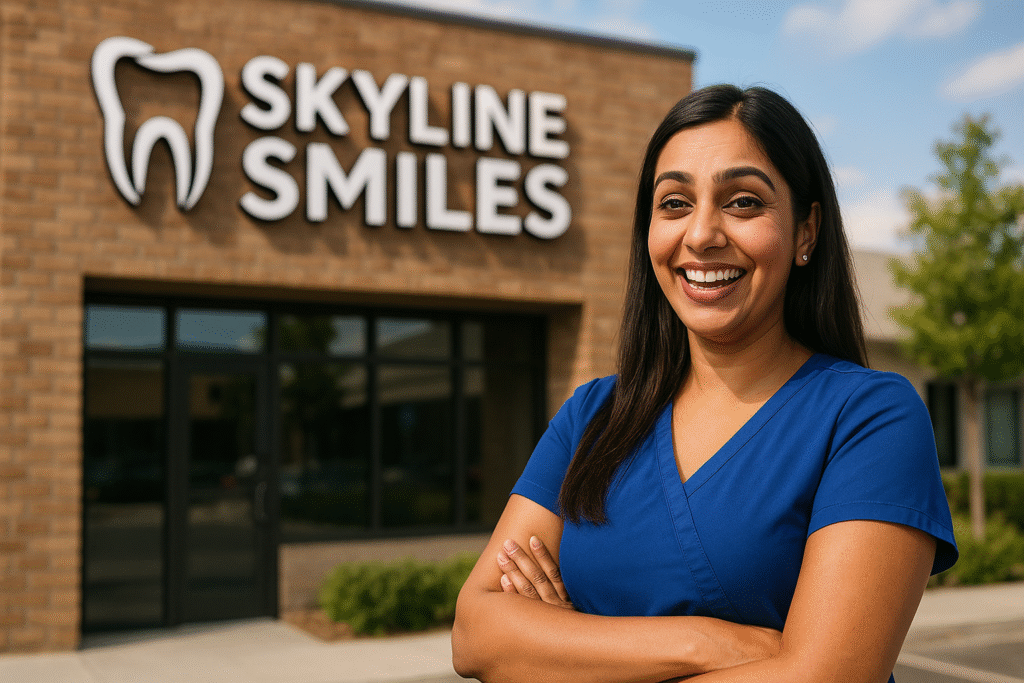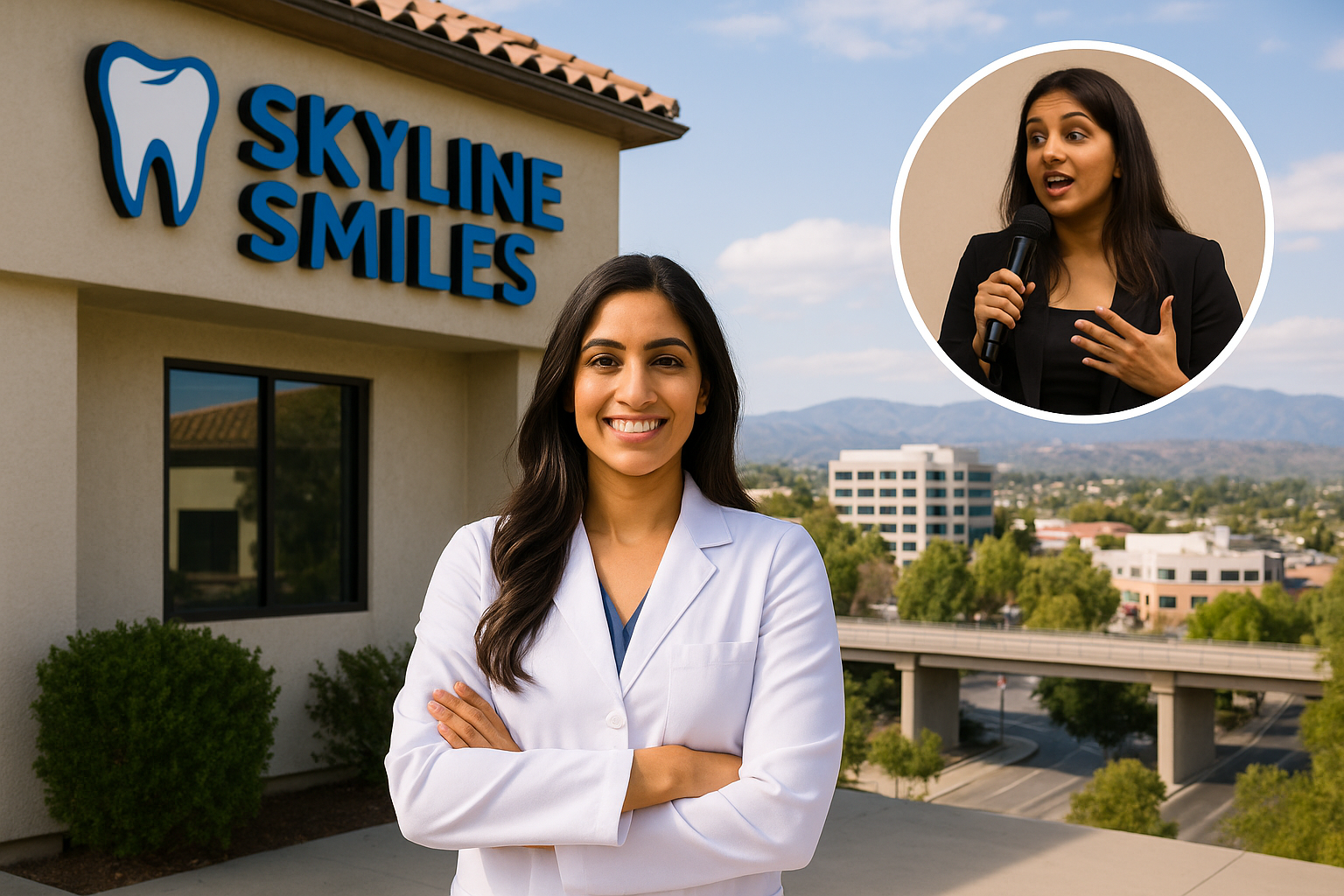Skyline Smiles and Harleen Grewal: A short video clip that recently resurfaced online has put Dr. Harleen Grewal — owner of Skyline Smiles in the Santa Clarita Valley — squarely in the headlines. The clip shows a past public speech in which she joked about treating patients differently based on their politics. The clip spread quickly on TikTok, X and Instagram and prompted strong reactions across the community, local media, and national outlets. This long-form, reader-friendly post walks through the timeline, context, practice background, ethical and legal considerations, what the practice has said (and not said), and practical steps for patients and local residents.
1) The core fact — what happened (short version)
Skyline Smiles and Harleen Grewal: A viral video clip circulating in late September 2025 shows Dr. Harleen Grewal making jokes about withholding care or adjusting treatment based on patients’ political views during an older speech. After the clip spread, local and national outlets reported on it, and many viewers criticized the remarks as unethical or unprofessional for a licensed healthcare provider. Dr. Grewal and Skyline Smiles have publicly responded in various places saying the comments were meant as humor and not reflective of patient care.
2) Who is Harleen Grewal and what is Skyline Smiles?
Dr. Harleen Grewal is a practicing dentist and the owner of Skyline Smiles, a family and cosmetic dental practice located in the Santa Clarita area (Saugus/Canyon Country). Her public profiles describe her as a pediatric and restorative dentist who operates the local Skyline Smiles clinic; the practice website highlights services such as veneers, aligners, pediatrics and restorative dentistry. Grewal has an active local presence (her practice received local “best dentist” awards in recent years) and maintains social media and LinkedIn profiles used for patient outreach.
3) Timeline: how the clip spread and the immediate media reaction
- The clip in question is from an earlier public speech (reported in multiple outlets). It began circulating on TikTok and other social platforms, prompting thousands of reactions within 24–48 hours.
- Local outlets in the Santa Clarita Valley picked up the story; within hours larger regional and national outlets republished or reported on the controversy. Public reaction included both calls for accountability and voices defending the footage as “old material” taken out of context.
Those are the observable facts about how the item moved through social channels and traditional newsrooms.
4) What the video actually shows (and what’s already been clarified)
Multiple published excerpts show Dr. Grewal making jokes about treating patients differently based on political leanings; some viewers interpreted these comments as threatening or indicating potential harm. The practice and Dr. Grewal later said the remarks were intended as “satire” or “humor” and not an indicator of clinical behavior. Local reporters have quoted both critics and supporters in their coverage. It’s important to separate the content of the clip (what was said) from intent (how the speaker characterizes it now) — both are relevant to public reaction but are distinct matters.

5) Ethical and legal considerations for clinicians
Healthcare professionals are bound by professional ethics and local licensing rules. Key points:
- Patient safety and non-discrimination: Licensed clinicians are ethically and legally required to treat patients without discrimination and to provide necessary standard-of-care treatment. Jokes or statements implying otherwise understandably trigger alarm among patients and professional peers.
- Professional conduct & licensing boards: If a clinician’s speech indicates real intent to withhold care or engage in harmful behavior, patients can file complaints with state dental boards or licensing authorities. Those boards investigate claims and may impose sanctions if standards are violated. However, a single joke—taken alone—doesn’t automatically equal professional misconduct; investigations weigh evidence and context.
- Free speech vs. professional responsibilities: Clinicians do have personal speech rights, but speech that plausibly endangers patient care or contravenes explicit professional duties can prompt regulatory review. The balance between free expression and professional duty is a common legal and ethical debate in such controversies.
6) What Skyline Smiles / Dr. Grewal have said publicly so far
Local coverage reports that Dr. Grewal and Skyline Smiles have defended the comments as jokes and insisted that all patients are treated equally in practice. Social posts and local interviews have included both apologies from some quarters and defenses from supporters. At the time of writing, no formal licensing board action had been publicly announced, and the practice remains listed as active on its business pages. Readers should check official statements from the practice and any updates from California dental authorities for developments.
7) Community impact — why local reaction has been intense
Skyline Smiles is a neighborhood clinic; local dentists, families and parents bring kids there for routine care. When a well-known local provider becomes the subject of controversy, the effects are immediate:
- Patients often ask whether it’s safe or appropriate to continue care at the practice.
- Local businesses and schools react when a prominent community figure is criticized or defended.
- Online reviews and appointment bookings may be affected in the short term if residents choose to pause visits while the situation unfolds.
Local reporters noted waves of comments and social posts both criticizing the clip and defending the doctor — a sign that local sentiment is mixed.
8) Practical guidance for patients and families
If you are a patient of Skyline Smiles or live in the area and are concerned, here’s a pragmatic checklist:
- Pause, verify, then decide. Don’t act on a single viral clip alone — look for the full context and official statements from the practice.
- Ask for information from the clinic. Request the practice’s current policies on non-discrimination, patient safety and grievance procedures. Providers commonly have written policies and patient-rights statements.
- Get a second opinion if you’re worried about care. For urgent dental concerns, seek immediate care from your nearest emergency dental facility or hospital dental clinic. For elective or routine care, you can consult another local dentist for peace of mind.
- File a complaint if you believe standards were actually breached. If you have evidence or experienced improper treatment, contact the California Dental Board (or your state’s licensing authority) to ask about filing a formal complaint. Board websites explain the process and what evidence is needed.
9) How journalists and readers can verify information (media literacy checklist)
- Check primary sources. Read the original video (if available), the practice’s statement, and local press coverage.
- Favor reputable outlets for follow-ups. Local newspapers and broadcast outlets that quote multiple parties and provide video/audio are more reliable than anonymous social reposts.
- Watch for official action. Licensing boards, hospital administrators, or legal filings are formal steps that indicate escalation. Absent those, the matter may remain a reputational controversy rather than a regulatory one.
10) Broader context — politics, healthcare trust, and social media
This incident sits at the intersection of three wider trends:
- Political polarization: Healthcare professionals making partisan jokes can inflame community trust, especially in politically mixed neighborhoods.
- Rapid virality: A talk given years ago can be clipped and repurposed, generating uproar long after the original moment. That’s a reality for many professionals who speak publicly.
- Patient expectation of neutrality: People expect healthcare providers to be neutral and prioritize patient welfare. Anything that undermines that perception — even in jest — can have real consequences for patient relationships.
11) Where this can go from here — likely scenarios
- De-escalation: The practice issues an extended apology or clarification, the clip dies down, and business returns to normal. This is common if no patient harm is alleged and the provider convincingly addresses concerns.
- Regulatory inquiry: If credible complaints alleging improper practice are filed, the dental board could open an inquiry. These processes are formal and can take months.
- Reputational impact / business change: Local clients may switch providers temporarily or permanently, and online reviews or appointment volumes may be affected. Many small practices recover with good community engagement; others rebrand or sell.
Disclaimer
This article summarizes publicly reported information as of September 2025 and is intended to inform readers on developments and options. It is not legal or medical advice. If you have immediate concerns about patient safety or believe you were harmed, please contact your local health authority or the California Dental Board. For personal legal advice, consult a licensed attorney. Images used in this article are royalty‑free or licensed for commercial use and are provided here for illustrative purposes.
Verified external links (authoritative; checked & working)
- Skyline Smiles (official Santa Clarita practice site — services & contact). (Skyline Smiles)
https://skylinesmilessc.com/services/ - Skyline Smiles — Facebook / local practice page. (Facebook)
https://www.facebook.com/SkylineSmileswithHarleenGrewal/
